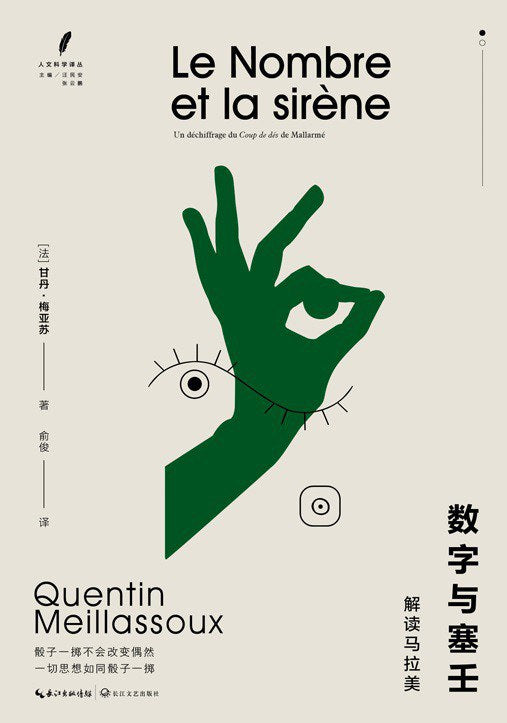WULOLIFE
《数字与塞壬: 解读马拉美》 作者: [法]甘丹·梅亚苏 译者: 俞俊 出版社: 长江文艺出版社
《数字与塞壬: 解读马拉美》 作者: [法]甘丹·梅亚苏 译者: 俞俊 出版社: 长江文艺出版社
Couldn't load pickup availability
Description
内容简介· · · · · ·
是唯一一首穿越了二十世纪的诗。它像是埋在地下的种子终于在下个世纪萌芽,像是在一个梦想破灭的时代我们离奇地赢得的一场防御战。
——甘丹·梅亚苏(Quentin Meillassoux),本书作者
★图书简介
马拉美晚年的诗作《骰子一掷不会改变偶然》是其最晦涩难懂的一首诗。这首诗的文字排列非常奇持,双页的空间由线条破开,字体大小不一,有时呈阶梯状,有时一页只有一个字或几个字。同时它的内容也很晦涩,其涵义今天仍然无法完全阐明。在现代诗歌史上,《骰子一掷不会改变偶然》是对现代诗最彻底的突破,构成了现代性最激进的文学断裂之一。
本书是法国哲学家甘丹·梅亚苏对《骰子一掷》的解读,梅亚苏假设马拉美在这首诗中隐藏了一个秘密,一个“唯一数字”,本书是文学研究,也是寻宝和调查。在书中,梅亚苏围绕着马拉美念,用其深刻的洞察力试图简单清晰地破译诗中的密码,质疑了“机会”“偶然性”“无限”和“永恒”等概念。通过对马拉美作品的大胆解读,梅拉苏对现代性、诗学、世俗主义和宗教提出了自己独到的见解,开启其激进偶然性哲学的新篇章。
★媒体评价
这本书一定会大受欢迎,它对马拉美的思想提供了决定性的独家解读。马拉美跨越了贝克特和萨特的世纪,向我们展示了荒诞的创造性力量。
——Philosophy Magazine
一件艺术作品。它很难被归入诗歌、修辞学或哲学的范畴,是形而上学,是悬疑调查,是侦探小说。 在梅亚苏清晰简洁的语言中,调查呈现出警察调查犯罪及其动机的样子,Chinese:
--Spiral
★读者评价
了一条新道路,并超越了康德主义在怀疑论和教条主义之间的二律背反。
——阿兰·巴迪欧,法国哲学家
《数字与塞壬》欣然接受了本书副标题发起的“破译”挑战,读者不仅可以发现贯穿全诗的密码,还可以还可以思考马拉美所承担的双重风险:他的诗要么不会被破译,永远被误解;要么相反,它被破译了,但看起来不过是一场文字游戏。
——Clément Layet,德国艺术中心(巴黎)
与20世纪普遍将马拉美的《骰子一掷》解读为自上帝死后文学失败的讽刺证明相反,梅亚苏展示了《骰子一掷》如何实现了19世纪浪漫主义对终极的渴望,这种渴望建立在人类内在不确定性之上。
——Grant Wiedenfeld
作者简介· · · · · ·
甘丹·梅亚苏(Quentin Meillassoux, 1967—,法国者之一,现为巴黎第一大学(先贤祠-索邦大学)哲学系讲师。主要作品有《有限性之后》《数字与塞壬》《形而上学和科学外世界的虚构》《没有生成的时间》。梅亚苏认为,哲学不是思考是什么、什么存在的学问,而是思考什么会成为可能、什么可能存在的学问。
